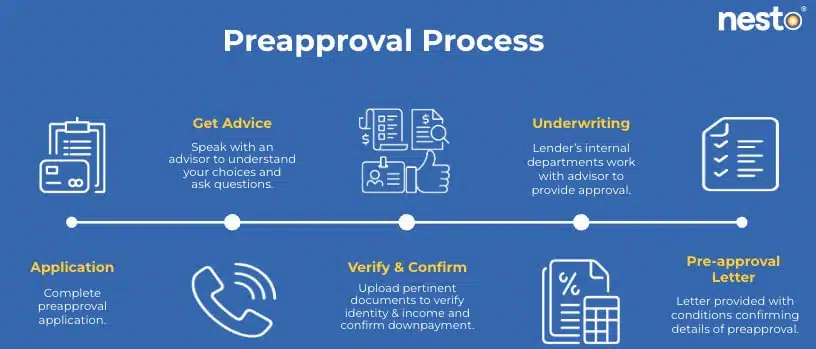How to Get Preapproved For A Mortgage in Canada

Table of contents
Did you know that one of homebuyers’ biggest mistakes is looking at rates or making offers without fully understanding how much they can qualify for? This is a key step in ensuring the rest of the mortgage loan process goes smoothly but is oftentimes overlooked. However, since you’ve landed here, you don’t have to worry about that! You’ll be armed with exactly what you need to know about getting preapproved for a mortgage and all the reasons it’s necessary to do so!
Skip reading, watch and learn all things about preapprovals below! 👇
What Is a Mortgage Preapproval?
A mortgage preapproval is a more comprehensive evaluation considering all your financial details. You can secure a rate for up to 120 days by obtaining preapproval. It’s worth noting that if you apply for preapproval, your credit report will not be impacted.
A mortgage preapproval can play a pivotal role during the homebuying process. Preapproval indicates that a lender has reviewed and approved your mortgage loan application based on your provided information and is subject to certain conditions. It will often indicate information such as terms, interest rate, and principal amount. Although not mandatory, it gives you a clearer picture of the house you can afford.
Mortgage Pro Tip: Skipping the preapproval step when applying for a mortgage could increase the risk of not being approved by a lender. Realtors and sellers often recommend getting fully preapproved to minimize the possibility of your mortgage application being denied, which could cause delays and hinder the sale.
What Is a Mortgage Prequalification?
A mortgage prequalification is a simple financial assessment, and it’s based on the self-assessed information you present to the lender. They’ll only need to confirm your address, identity and income.
The verification of these details is usually quite loose and varies between lenders. Since it is only an assessment, the mortgage expert will ask questions about your financial position (savings, downpayment, debts) to see if they make sense for your employment and age.
Many smaller lenders do not offer preapprovals because they have limited funds. Instead of holding a rate for a potential client that may not return, they use those funds to provide mortgages for their clients.
These lenders, usually not the big banks, prefer to keep their best rates for live applications (accepted offers) and won’t offer preapprovals – instead, they may offer a prequalification.
Preapproval Versus Prequalification
Preapprovals and prequalifications are similar in that they occur before you accept an offer on your prospective subject property.
What differentiates the two is that prequalification does not require the lender to hold a rate for you, whereas preapproval does.
Some lenders and brokers may present these opposingly, but the idea is the same: they gauge your ability to carry a particular mortgage.
A prequalification is much simpler as it’s based on self-reported data, whereas a preapproval is based on variable data.
Preapprovals require more documentation to be presented to the lender – almost as much as getting approval – except for documents related to the property or contact information for your solicitor.
Both of these processes are generally conducted before you make offers on properties. Neither process guarantees mortgage financing since the property, once found, would need to be evaluated alongside all the property details to ensure lending ratios (LTV, GDS and TDS – We’ll go over these three lending ratios in detail).
The complete mortgage approval process may be finalized upon receiving your accepted (typically conditional) home offer. Your nesto mortgage expert will help with the remainder of the details, outlining all closing costs and necessary documentation to finalize your fully-approved mortgage application. The basis of your final approval depends on your financial information, provided documents, and the quality and condition of the home you are purchasing.
Important note: A prequalification or preapproval does not guarantee approval from a lender. However, it will give you a good idea of your potential approval amount, allowing for more confident house shopping.

Where Can You Get Preapproved for a Mortgage?
You could obtain your mortgage preapproval by going to a lender directly. Many entities, like banks or financial institutions, mortgage finance companies (MFCs), mortgage investment corporations (MICs), or alternative/private (also called subprime) lenders, could underwrite your mortgage and provide a preapproval.
You could also obtain your preapproval through a mortgage expert, such as an agent or broker, specializing only in mortgage financing. They are considered middle people who deal with multiple lenders, helping you find a suitable solution. Mortgage brokers generally will not charge a fee since they receive a healthy commission from the lender.
It is essential to review your credit score well before considering homeownership to see which type of lender or mortgage financing would be most suitable for you.
Suppose you have an excellent credit rating or less than 20% downpayment (net of debts). In that case, you should consider a mortgage finance company first, as you’ll be able to access their exceptionally lower rates.
On the other hand, if you’ve got a low credit score but have access to a 20% or more downpayment (net of debts), then you should consider a mortgage broker who will have access to both prime and subprime lenders and the ability to place you wherever you’ll qualify.
Lastly, if you have a low credit score (lower than FICO 650) and less than a 20% downpayment (net of debts) saved up, you’ll need to improve your credit to have a manageable mortgage payment with a lower mortgage rate.
Important: Shopping around for the best mortgage option during your preapproval stage will not affect your credit score, as lenders will pull a soft credit check, which does not remove points from your credit score.
Learn about different types of lenders or how to improve your credit score. Perhaps you’re looking to buy a home as soon as possible. There are some options for getting a mortgage with bad credit.
Mortgage Preapproval Considerations
The main things to consider in the mortgage preapproval process are:
- Look for the best rate possible. Explore different vendors and rates, and find a realistic and appealing mortgage. Factors like your down payment, amortization, and whether you should choose a fixed or variable interest rate will significantly impact your monthly repayments.
- Be conservative with your budget. You don’t necessarily have to purchase a home at the upper limit of your preapproved amount. Remember, you’ll also need to budget for closing and moving costs, plus any repairs and upkeep for your new property. Budget for surprises and closing cost overlays such as independent legal advice or a home inspection (always recommended).
- Appraisals can be their worst enemies. The amount you settle for your home purchase is not the property’s final valuation. The lender will complete due diligence to confirm the price; if the lender is unsatisfied, they will request an appraisal. An appraisal that comes lower will dictate your mortgage financing amount – as the lender will use the amount less your downpayment to confirm your qualifying mortgage amount.
- Consider the stain of homeownership on long-term plans. Contrary to what you’ve been told, you can’t simply buy a home and make payments, hoping you’ll be able to use it one day to live on in retirement. Assess your post-purchase budget, and be sure you have enough cash flow for discretionary spending or long-term investments. Set aside money for repairs and maintenance so you’re not caught off guard if something costly is needed (for example, your roof leaks or your condo board issues a special assessment).
- Do not make significant changes that could impact your finances. It’s not a good idea to make significant purchases, change jobs, or take on large amounts of credit before you have received final approval from your lender or broker. Even after a successful preapproval, significant financial changes could reduce the likelihood of getting your mortgage approved.
Mortgage Financing Documentation
Mortgage financing requires a slew of documentation at each step. There is a big difference between the documentation needed for prequalification, preapproval or mortgage approval. This section will discuss the documents needed for each process and why.
Documents Needed to Complete a Mortgage Prequalification
As mentioned earlier, the documents needed for a prequalification list are concise. Some documents verify your details, while others confirm the same during the prequalification. Your lender or broker is looking to confirm the details that you presented that were presented in your application.
| Document | Confirming | Reason |
|---|---|---|
| Paystub(s) | Income & Employment (Personal) | Understand the income/employment used to qualify for a mortgage. |
| Statement of Remuneration (T4s) | Income & Employment (Self-employed or Incorporated) | Understand the income/employment used to qualify for a mortgage for someone who is a sole or partial company owner. |
| Drivers Licence / Passport + 1 other | Identity. | Confirm identity and that the applicant’s and their name match as presented in the application. |
If you’re separated or divorced, you won’t be asked to provide your separation or divorce agreement (for spousal or child support).
However, your mortgage advisor will still need to confirm if you have any obligations to list as part of your regular debt repayments. If you receive child or spousal support, you’ll need to add this to your income, and primary proof may be required, such as a bank statement showing that it’s being deposited into your bank account.
Documents Needed to Complete a Mortgage Preapproval
| Document | Confirming | Reason |
|---|---|---|
| Paystubs | Income | Understand the income/employment used to qualify for a mortgage. |
| Statement of Remuneration (T4s) | Bonus Income | Confirm the salary, time on post job title, etc. |
| Letter of Employment (LoE) | Employment | Confirm the income or obligations under the separation. To confirm income, you will need 2 months’ bank statements. |
| Notices of Assessments | Commission or Self-Employment Income | The 2-year average is used for qualifying income. |
| Financial Statements | Corporate Income | Confirm child tax benefit. For children under a certain age who are UCCB beneficiaries, two months’ bank statements and birth certificates will be required. |
| Corporation Income Tax Returns (T2s) | Corporate Income Taxes | Confirm no corporate taxes owing. |
| Business License | Registered Business Name | Confirm if a sole proprietor is registered under a name different than their personal name. |
| Business Account Statement(s) | Business Income | Confirm the duplication of employment income when clients are self-employed. |
| Separation Agreement | Spousal or Child Support | Confirm child tax benefit. For children under a certain age who are UCCB beneficiaries, 2 months’ bank statements and birth certificates will be required. |
| Universal Child Care Benefit Statement | Federal Child Tax Benefit | Confirm the income or obligations under the separation. To confirm income, you will need two months’ bank statements. |
| Drivers Licence / Passport + 1 other | Identity. | Confirm identity and that the applicant and their name match as presented in the application. |
Documents Needed to Complete a Mortgage Approval
As with many stages of the homebuying process, you must submit several essential documents for the final mortgage approval to provide proof of finance. At this stage, the lender seeks to validate all details related to the borrower’s income(s), downpayment, closing costs, and the purchased property.
This is not an exhaustive list, these documents are needed in addition to those we listed for preapproval documents:
| Document | Validate | Reason |
|---|---|---|
| Bank Account Statements | Incomes | Receipt of different incomes. |
| Business Account Statements | Business incomes | Receipt of self-employed incomes. |
| Savings Account Statements | Downpayment and closing costs. | 90-day validation of downpayment and closing costs. |
| Deposit Cheque Copy | Part of the downpayment was made to secure the purchase. | Deposit made to the lawyer’s trust (a third party to reduce the risk of fraud) as confirmation of the purchase undertaking. |
| Investment Statements | Downpayments and closing costs. | 90-day validation of downpayment and closing costs. |
| Purchase Agreement | The purchase price, property details, closing date, conditions and stakeholders. | Confirm conditions, dates and values required to make mortgage closing go smoothly. |
| Notice of Fulfilment | Outstanding conditions completed. | A waiver once conditions listed in the purchase agreement have been satisfied. |
| MLS | Confirm publicly listed property with taxes and property details. | Secondary confirmation of the real property for sale and match property details to the purchase agreement |
| Appraisal | Property value and condition | Confirm property is in conditions that meet the lender’s requirements. |
| Status Certificate (Condo only) | Maintenance fees, reserve fund, insurance and legal issues. | Confirm that a condo corp and board’s legal position, the reserve fund, insurance coverage, and maintenance fees are in good standing. |
| Void Cheque | Bank account for mortgage payments. | Confirm the bank account belongs to the borrower who will be on the mortgage and set up an automatic payment plan for the mortgage. |
| Stakeholders | Realtor and real estate lawyer’s name and contact info. | Confirm the details of the professional you’re working with. |
Important: If you’re new to your position or employer but past your probation period, you may also be required to submit similar information from your previous place of employment. It’s strongly recommended that you hold off switching employers/jobs until your mortgage closes. Lenders may not consider income within your probationary period. There are exceptions, but why risk your mortgage approval on a hunch? In the same vein, avoid making large purchases on credit that may affect your credit limit or qualify for new credit. This will help your mortgage experience run a lot smoother.
Get approval on your low rate today
No big bank bias, just commission-free experts ready to help you.
Questions to Ask Your Lender When Getting Preapproved or Prequalified
When you’re satisfied with your prequalification and wish to proceed with a preapproval, ensure you ask your lender how long they’ll guarantee your rate hold – this will confirm their rate lock period for your chosen mortgage rate. Also, your lender may offer a float down, allowing you to automatically hold a lower rate if rates fall during your rate lock period. Be sure to confirm if your lender allows extensions on your rate hold.
Your Options if Your Mortgage Is Not Approved
The mortgage financing approval process is rigorous and for good reason. Lenders must evaluate your ability to repay and the risk you pose to them.
Getting your mortgage application rejected can be a downer experience, especially if you have already found your dream home and are counting on the loan to secure your purchase.
However, a mortgage refusal doesn’t necessarily mean the end of your homeownership dreams.
The first step towards finding an alternative solution is understanding why your mortgage application was declined. Lenders expect borrowers to meet specific requirements, such as minimum credit scores, stable employment, and sufficient income and assets.
Once you know why your mortgage was not approved, you can address them and work on improving your financial situation.
If your income is insufficient to qualify for your mortgage amount, consider adding a strong guarantor or co-signer to your application to decrease your application’s risk status to the lender. It’s often worth seeking alternative mortgage options, such as specialist lenders or credit unions, that may have different lending criteria or be more willing to take a chance on you.
Your credit score plays a vital role in your mortgage application, and a low score can be a red flag for lenders. If your credit score is less than ideal, improve it before reapplying for a loan. This might include paying debts, avoiding new credit applications, and checking your credit report for errors or mistakes. Improving your credit score may take time but can significantly affect your ability to secure mortgage approval.
You may need to consider waiting and saving until you meet the lender’s criteria. This may involve putting off your homeownership plans for a while, but it can also give you more time to improve your credit score and increase your chances of approval or save up for a higher down payment. Buying a home is a significant financial decision; rushing into it without adequate preparation can lead to costly mistakes.
Some of the most common reasons that get in the way of an outright mortgage approval revolve around eligibility and risk level. Ask your mortgage expert about other types of lenders if you’re turned down for a mortgage. Subprime (alternative and private) lenders have different lending criteria from more prime (traditional) lenders, including easier qualification requirements and longer amortizations.
Frequently Asked Questions
Welcome to our Frequently-Asked Questions (FAQ) section, where we answer the most popular questions designed and crafted by our in-house mortgage experts to help you make informed mortgage financing decisions.
What is the difference between mortgage preapproval and approval?
The final mortgage approval is based on rigorous verification and validation of your financial position (income, downpayment and creditworthiness with a hard credit check) and the ability to carry a mortgage on the subject property you’ve been accepted to purchase. The preapproval is not specific to a property, only requires a soft credit check and does not guarantee your approval.
What is the difference between mortgage preapproval and prequalification?
A mortgage preapproval is a financial assessment based on documentation that verifies income and identity with an understanding of the assets and validates creditworthiness through a soft credit check. A prequalification is similar, except the lender does not place a rate hold or guarantee your qualification amount for a set period – say 60, 90 or 120 days.
When is a mortgage prequalification more suitable than a mortgage preapproval?
A mortgage prequalification is more suitable than a mortgage preapproval for more creditworthy and fiscally responsible individuals who want an assessment to understand their qualifying mortgage amount but plan on staying well below that amount. It’s also recommended when mortgage rates are decreasing or the market is fast-paced.
Should I complete a pre-approval or a pre-qualification?
Pre-approvals and pre-qualifications assess your borrowing ability based on income, credit, savings, and net worth without considering a specific property.
Pre-qualifications do not include a set rate but will use qualifying rates at the time of application to assess your ability to carry a mortgage. Pre-approval with rate holds can provide peace of mind during a property search but may come with a slightly higher rate.
Lenders offering pre-approvals with rate holds could lock you into a higher rate. Some lenders provide pre-qualifications without rate holds to save costs for clients with accepted offers. Lenders with the best rates typically offer realtime rates that can be locked in once your purchase offer is accepted.
Final Thoughts
Getting preapproved or prequalified for a mortgage is vital when purchasing a home. Understanding the amount you can borrow and what you can afford through these assessments is a key first step. Knowing your financial limitations and constraints can help you focus your search on targeting homes suitable for your budget. These valuable assessments also prove helpful, making homebuyers more appealing to sellers and increasing the chances of accepting your offer.
Suppose you’re excited about purchasing a home. In that case, it’s advisable to be prepared, educate yourself, be fiscally responsible, and speak with our commission-free mortgage experts for guidance in your homeownership journey.
Ready to get started?
In just a few clicks, you can see our current rates. Then apply for your mortgage online in minutes!















